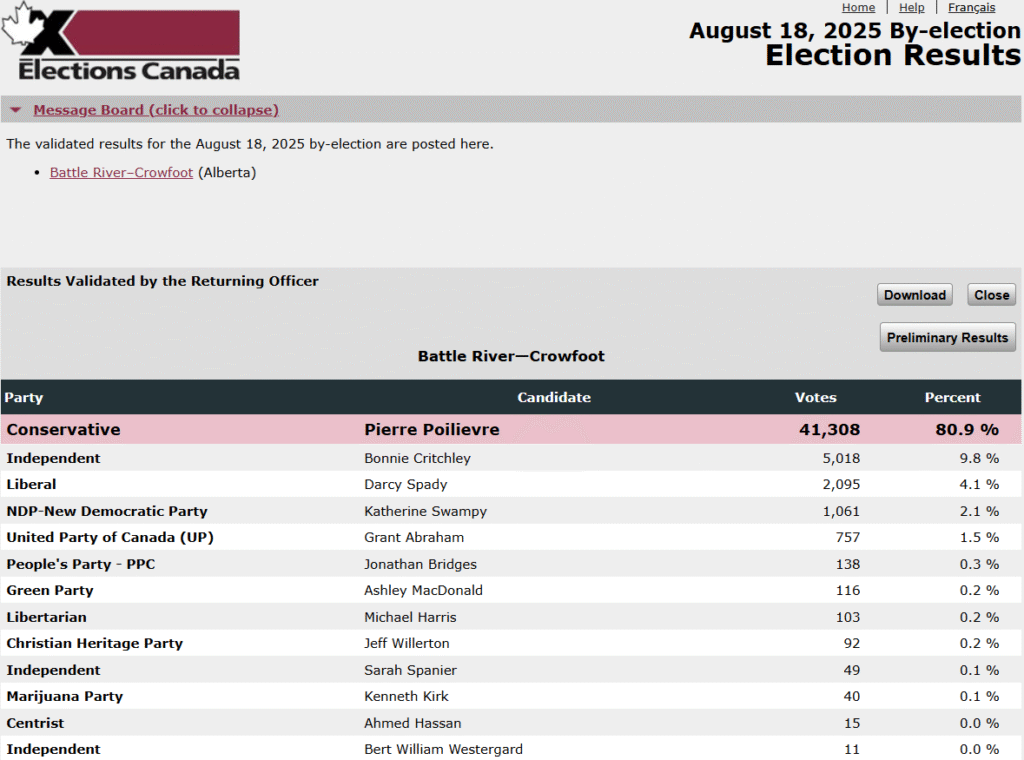Battle River – Crowfoot August 18, 2025 Federal by-election
The 2025 voting results from the riding of Battle River – Crowfoot in Alberta are reviewed here as a good example for discussion purposes and are not intended to single out the riding or the voters who live there.
Pierre Polievre, Federal Conservative party leader, was defeated in his home riding the last federal election. This made it impossible for the party leader to function as Leader of the Opposition in parliament. To address the issue, a riding was selected as a “safe’ riding for the leader to run as a parachute candidate. The riding’s conservative winner in the last election resigned so that this could happen.
“The history of the riding and its previous incarnations indicate it has been one of the safest blue seats in the country. “ What you need to know about the federal byelection in Battle River-Crowfoot | Radio-Canada.ca
In response to this manufactured requirement for a by-election, 213 other candidates also registered. Some are serious opposition to Poilievre’s campaign, but most “are associated with a group of electoral reform advocates known as the Longest Ballot Committee. The committee has been organizing candidates to run in byelections in recent years to promote electoral reform.” What you need to know about the federal byelection in Battle River-Crowfoot | Radio-Canada.ca
The tactic of flooding the candidate list met with pushback from other legitimate candidates. There was also additional burden on the vote counting process, with the use of a manual system to record paper ballots.
The Longest Ballot Committee (represented by Tomas Szuchewycz) spoke at a meeting of the procedure and government affairs committee in Oct. 2025. Officials are mulling whether to make election rule changes to curb long ballot protests. The committee challenged Szuchewycz on how the group was meeting the minimum signature endorsement rules for its candidates. Szuchewycz challenged the committee on whether they (elected officials) should be the ones making policy changes to the electoral process.
MPs grill long ballot organizer during tense committee meeting | CBC News
The Longest Ballot Committee says it’s pushing for electoral reform and Szuchewycz told MPs it’s been “successful beyond anything I honestly could have ever imagined,” citing media attention. Longest Ballot Committee faces MP questions on recent election – National | Globalnews.ca
Some possible results from the Longest Ballot Committee campaigns:
Voter Education: The movement sparked conversation. Local forums, community discussions, and social media chatter began focusing not just on policy, but on the electoral system itself.
Ballot Awareness: With dozens of names on the ballot, voters were forced to confront the absurdity the Committee was highlighting—why, in 2025, are we still limited to a system that discourages cooperation and rewards strategic voting?
Political Pressure: By inserting themselves into a high-profile race, the Longest Ballot Committee nudged national parties to at least acknowledge the simmering demand for electoral reform.
From The Longest Ballot Committee: Taking a Stand, One Name at a Time – NLWX | NL Weather & News

Result: Election Night Results – Electoral Districts
In terms of outcome in the election in the riding, the many non-valid candidates had little effect. The votes captured by non-candidates in a 200+ candidate field have no value.
I believe it would be better in terms of promoting electoral reform if the Longest Ballot Committee became a “one issue” party for electoral reform and fielded only one or two candidates in every riding in the next (and future) general election. Then citizens could use their vote for Longest Ballot Committee candidates to directly endorse electoral reform in an unambiguous way.
